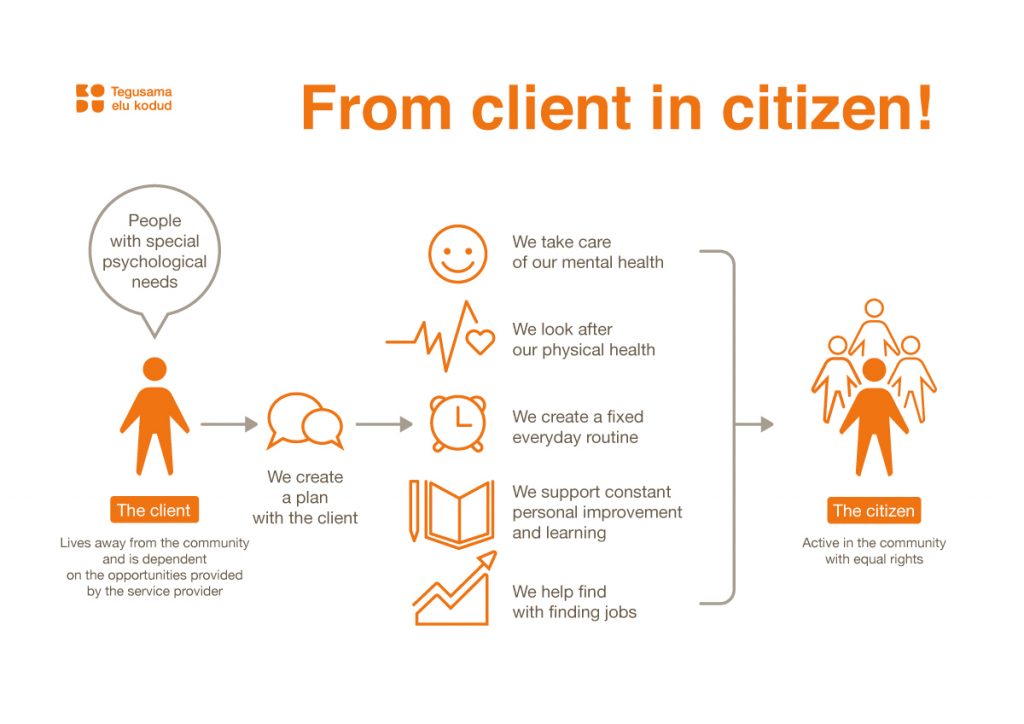Mission and vision
Our mission
Our mission is to create opportunities for active lives in the community for people with special needs.
We believe that people with such needs are valuable members of society who must be given equal opportunities to lead rich, active lives.
Not only is the inclusion of individuals with special needs important in order for them to feel that they are being treated with dignity, but it is also important for society – everyone is able to contribute to creating well-being and take responsibility and thereby help reduce the social and economic risks that can arise as a result of isolation, inactivity and discrimination.

Our vision
By 2028, we see ourselves as being a nationwide provider of special care services to help individuals with special psychological needs to grow from being clients into citizens.
In order to do this we provide clients with services that are based on the recovery approach, include community integration, consist of flexible components and into which information technology is integrated.
What we mean by services being based on the recovery approach:
- we create a specific service by working with the client in question – we always include the client in making decisions concerning them;
- we guarantee to the client the accessibility of mental health support and programmes necessary for multifaceted recovery;
- we enable the client to live as normal a life as possible in the community in spite of the client’s vulnerability.
Community integration means that the client uses the individual services alongside other people in the community on a daily basis and that various service providers (shops, employers, banks, etc.) are capable of independently serving individuals with special psychological needs.
What we mean by the service consisting of components is that in providing the service, we first assess the person’s wishes and how the person is coping and thereafter design a personal service along with the client based on the components of the different aspects of their life. We aim to provide the components of the service to our client in the following manner:
- according to a flexible schedule – the client plans and carries out their daily activities at the time best suited to them, just as they would in regular life, and we adapt our service provision accordingly. We are prepared to provide the service components to our clients on an hourly, daily, weekly or monthly basis;
- flexibly in terms of location – we provide the service components in an environment appropriate to the specific activity and most suitable to the client (for example, for work activities we move from the housing unit out to the workplace).
What we mean by the integration of information technology is that information technology tools are integrated into our services (ICT tools and solutions). We are the leaders of innovation in this field and are recognised experts in our field. Stages of implementing our vision
The prerequisite for implementing our vision is reorganising large, dormitory-type homes into a modern network of private service units divided into communities.
As part of this project, which began in 2010 and which is funded from the ERDF and state budget, we had reorganised approximately 1200 service units by the end of 2018 (60% of the total number). Taking into account the fact that the final deadline for the eligibility of ERDF funding is 2023, within the next four years we must first and foremost focus on successfully completing the project and focus less on the development of other areas. Thereby, the implementation of our vision is split into two stages:
| 2019-2022 | 2023-2028 |
| We will finish creating the service units within the framework of the second stage of the ERDF project. | We will establish the service being provided on the basis of the recovery approach in all service units. |
| We will establish the service being provided on the basis of the recovery approach in all service units created in the second stage of the ERDF project (the 24-hour apartment buildings and community living apartments). | We will establish the service being provided on the basis of the recovery approach in all service units. We will base service provision on the components of the different aspects of the client’s life and will provide the services flexibly in terms of time and place. |
| We will make the community’s resources available to all clients living in the service units created in the second stage of the ERDF project. | We will make the community’s resources available to all clients and use the community’s resources in the company’s undertakings. |
| We will implement information technology to manage client work and in order to provide a more personal approach (e-Files, digital solutions in the field of human resources and data warehouses). | We will implement information technology to manage client work and to provide a more personal approach, to help our clients grow, to boost their quality of life and to secure more effective service provision. |
Our strategic goals
Our aim is to create 1000 modern service units in communities by 2023, where the service provided is entirely based on the recovery approach.
In order to achieve our aim, we have worded key factors of success in four different areas: clients; working arrangements; teaching and development; and finances. In the next four years we will focus on the following:
- Clients have been prepared for change. (Clients)
- Service provision is based on co-creation. (Working arrangements)
- The standards of service units are described. (Working arrangements)
- There are sufficient labour resources. (Teaching and development)
- Personal Assistants understand the recovery approach. (Teaching and development)
- Information technology tools support working arrangements.
- New service units have been created. (Working arrangements)
- The business model of the service unit is economically sustainable. (Finances)
